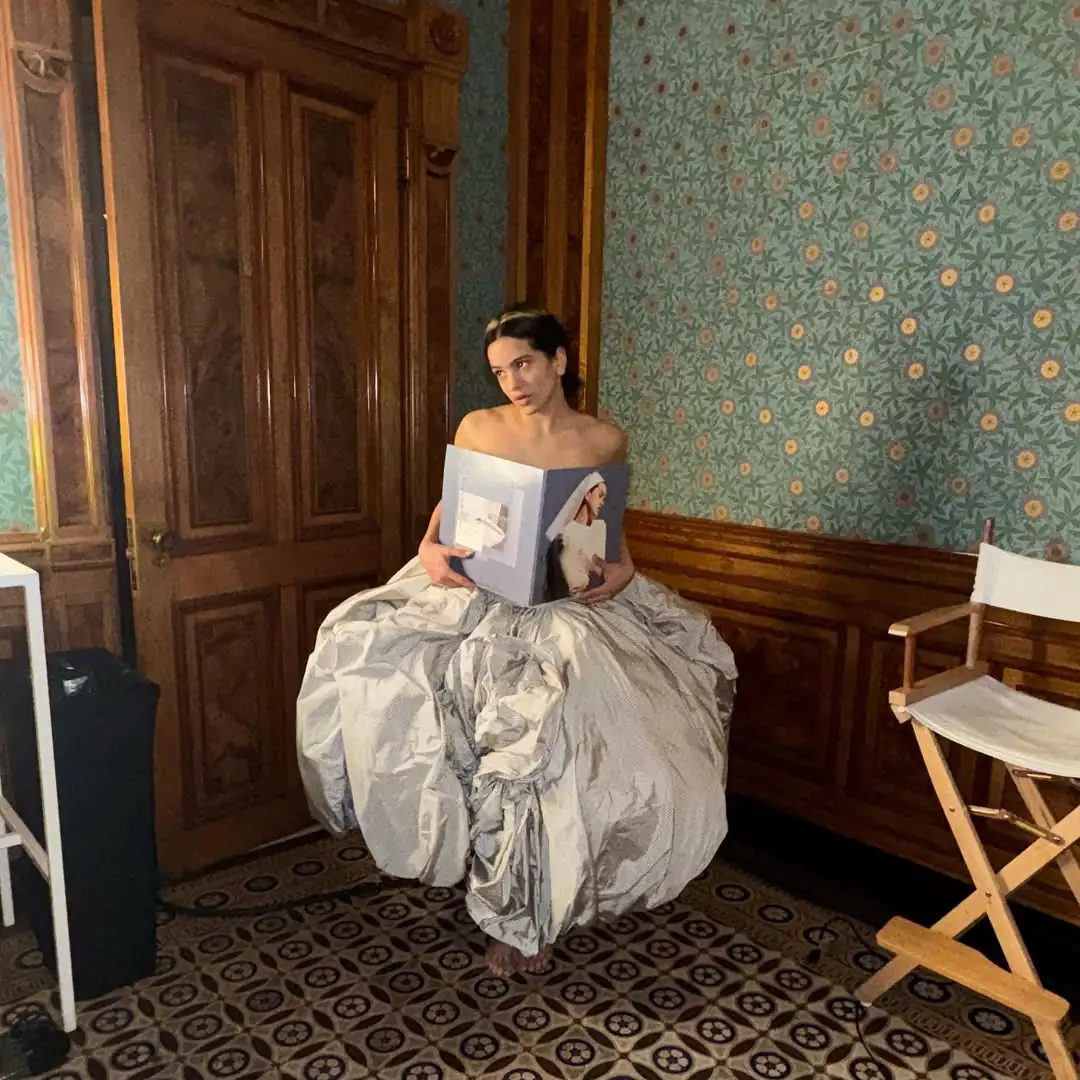Rosalía’s new album proves pop can still reinvent itself
Tara ĐukićNovember 7, 2025


The most anticipated album of the year is here: last night, I switched on Do Not Disturb mode, put on my headphones, and prepared for an extraterrestrial meditation. Rosalía took me on a journey through memories — from Saturday morning ballet classes and midnight liturgies to Latin textbooks and that epochal, Berghain-like ecstasy I’ve been chasing in adulthood. And there’s something profoundly feminist about it. “We’ve moved from the provocative ‘brat’ femininity that follows the path of problematic pop princesses like Britney Spears, Christina Aguilera, or Paris Hilton, to a provocative femininity of a more traditional kind — inspired by feminine mysticism and Madonna’s subversive religiosity,” she said in an interview for Vogue Spain.
Lux redefines Rosalía’s relationship with fame. While Motomami celebrated the chaos of her stardom, here she observes it from a distance. The religious imagery isn’t just a marketing move but a prism through which she contemplates faith, sin, and sacrifice. Contrary to the debate about the rise of conservatism, her goal is certainly not provocation but exploration — an examination of the limits of expression freed from commercial logic, and proof that she can merge her formal education, global curiosity, and pop instinct into a singular vision. There’s no formula for a perfect album, but there is something close to grace when an artist fully trusts her instinct — and surrenders to it.
Lux, from the Latin “light,” is her personal quest for female mystics around the world — showing how many different understandings of holiness exist, depending on each civilization’s cultural heritage. Rosalía herself gives examples: rishis from Hinduism, haredim from Judaism, qiang from Taoism, and awliya Allah from Islam. Quoting Simone Weil, she says that the ability to understand another goes hand in hand with the ability to understand oneself. She’s inspired by women who lived unconventionally — Weil herself, the “red virgin,” who lived by her own rules, as well as Jeanne d’Arc, Inanna, and Santa Lucia. She’s drawn to the worldly, the human within the divine, reflected in the forms divinity takes. We are, then, becoming a little polytheistic — in an age when no one truly belongs to anything anymore, yet everyone is still searching for the absolute.
Last week, Rosalía appeared on a podcast to discuss her fourth studio album. At one point, the host asked if she thought Lux demanded too much from its listeners — a question that wasn’t unfounded, considering it’s a four-movement song cycle based on the lives of various female saints, sung in thirteen languages and accompanied by the thunderous London Symphony Orchestra. Most intriguingly, the album she hoped would popularize classical music sounds nothing like what her fans are used to. “Absolutely,” Rosalía replied, describing Lux as a response to the instant dopamine rush that comes from mindless social-media scrolling — this, she said, is something that requires our full attention. Pop music today rarely asks much of its listeners; everything is tailored to ease and accessibility, as if sound itself has become an extension of the way we consume it. At times, it feels as though streaming algorithms — endlessly suggesting “something similar to what we already like” — are dictating the careers of the artists themselves. But Rosalía knows how to challenge her audience. Motomami, infused with reggaeton, hip-hop, dubstep, dembow rhythms, and experimental electronica, marked a sharp departure from her breakout 2018 album El Mal Querer — a pop reinterpretation of flamenco that, remarkably, began as her university project. It’s no coincidence that the most notable guest on Lux is Björk, whose unmistakable voice appears on the track Berghain, floating between the grandeur of the orchestra and Rosalía’s soaring soprano. It’s hard not to think that Rosalía sees Björk as a kind of idol — an artist who has built a decades-long career on aesthetic and creative reinvention.

Photo: Instagram / @rosalia.vt
Rosalía hesitated to even call Lux a classical album, but there’s no denying that the baroque references — most notably Vivaldi’s — permeate and define it. Her willingness to abandon convention runs deep. Growing up north of Barcelona, Rosalía discovered flamenco at thirteen, when she first heard the rhythmic palmas coming from a friend’s car — and instantly knew it would define her life. She studied under José Miguel “El Chiqui” Vizcaya and earned the only annual spot in the flamenco program at the Escola Superior de Música de Catalunya, graduating as a flamenco vocalist. That academic rigor still underpins even her most radical experiments. Los Ángeles was a stripped-down homage to cante jondo tradition; El Mal Querer became a conceptual album inspired by a 13th-century Occitan novel, blending flamenco with R&B and electronic music; Motomami deconstructed reggaeton and hyperpop, reflecting on fame, gender, and cultural appropriation. Lux continues this lineage of metamorphoses — a 15-track cycle divided into four movements, each following a distinct emotional trajectory. It’s not a return to tradition but a synthesis of everything she’s learned: baroque grandeur, global languages, and digital noise, all in the same breath.
Lux asks listeners to let go of expectations and allow the artist to lead them — which, of course, is no small demand. The album is long, with fifteen tracks (fifteen on streaming, eighteen on vinyl), and its narrative — sung in thirteen languages — is almost impossible to follow, even with lyric sheets that attempt to translate the abrupt shifts between Spanish, Mandarin, Ukrainian, Latin, and more. Yet amid this kaleidoscope of motifs about God, Catholicism, and transcendence, there’s a grounded theme too — like the story of an ex-boyfriend who earns his “gold medal” for bad behavior in La Perla, where she calls him an “emotional terrorist… world-class at failure.” At first, I was disoriented by all the linguistic and symbolic layers, but the truth is, you don’t need to understand every word for Lux to be an utterly moving experience. Each song is charged with intensity — from the Aphex Twin–like frenzy of Reliquia, to the whirlwind of voices and strings in Jeanne, or the moment in De Madrugá when the orchestra suddenly erupts, shifting tone and scale. Rosalía’s vocals transcend every boundary of expectation — equally convincing when performing fado-inspired melodies on La Rumba del Perdón, rapping, or singing operatically as if on the stage of the Royal Opera House. Despite its technical virtuosity, her voice carries a raw emotion that dismantles any claim that Lux is a cold intellectual exercise. The effort behind it — from mastering new languages to collaborating with Pulitzer Prize–winning composer Caroline Shaw — culminates in an album of extraordinary dramatic power.
Three years in the making, one year spent perfecting the lyrics, and recorded with the London Symphony Orchestra under the baton of Daníel Bjarnason — joined by the Escolanía de Montserrat and L’Orfeó Català choirs, both of whom she has collaborated with before. Across the album’s four acts, Rosalía sings in thirteen languages — Spanish, Catalan, English, Latin, Sicilian, Ukrainian, Arabic, German, and more — treating each as an instrument of its own. “If I could, I’d sing in every language in the world,” she said at a press conference in Mexico City. Lux is her Babel of sounds — disorienting, yet deeply inviting. At the heart of the first act lies Porcelan, a piece that moves from waltz to breakbeat — instantly my favorite after the first listen. The verses are partly in Japanese, the chorus carries flamenco palmas, and midway through, a violinist from the London Symphony Orchestra can be heard counting beats. That mix of playfulness and precision continues in another standout track, Sexo, Violencia y Llantas, which grows from a whisper into a tribal rhythm. Mio Cristo unfolds as a classical Italian aria about Christ, whose tears turn into diamonds, only to give way to the unexpected postmodern pop of Berghain — the track that completely mesmerized us. In the fourth act, the closing track Magnolias gathers all the album’s motifs: verses in Catalan and Spanish, a boys’ choir, a guitar reminiscent of Camarón de la Isla, and the voice of her grandmother. “What I haven’t done in life, you’ll do after my death,” she says — and in that grandeur, she remains intimate. You can hear her breath, her laughter, her counting between takes; vulnerability becomes triumph.

Photo: Instagram @rosalia.vt
Lux doesn’t build commercial momentum — but it undoubtedly constructs an emotional architecture: Desgarro shakes, Eco heals, Elevación uplifts, Expansión liberates. This is an anti-streaming work; its hits are buried beneath layers of meaning, which almost guarantees it won’t reach the mainstream success of Motomami or El Mal Querer (even though the global triumph of the single Berghain might suggest otherwise). And there’s something reassuring about that. Rosalía isn’t writing TikTok-ready hooks — she’s crafting a state of mind with intention and depth. Silence and restraint become her key effects; she asks us to listen closely, to tune in to our own pulse. In the end, Rosalía leaves us in a place no prophet has mentioned and no poet has described — a place none of us have ever been, imagined only by her, and perhaps by her God.